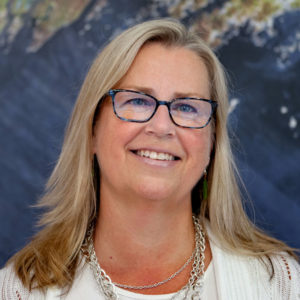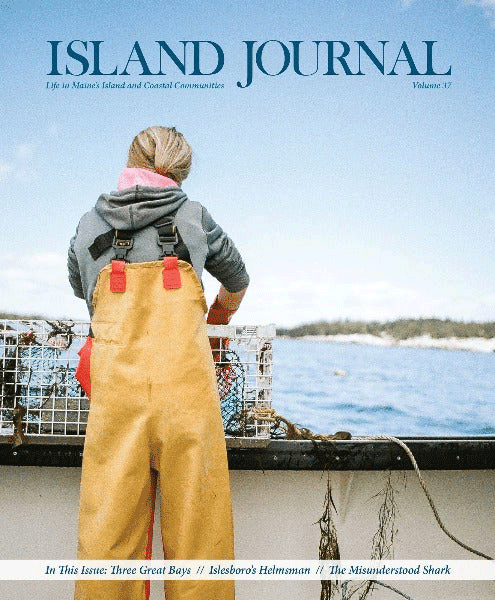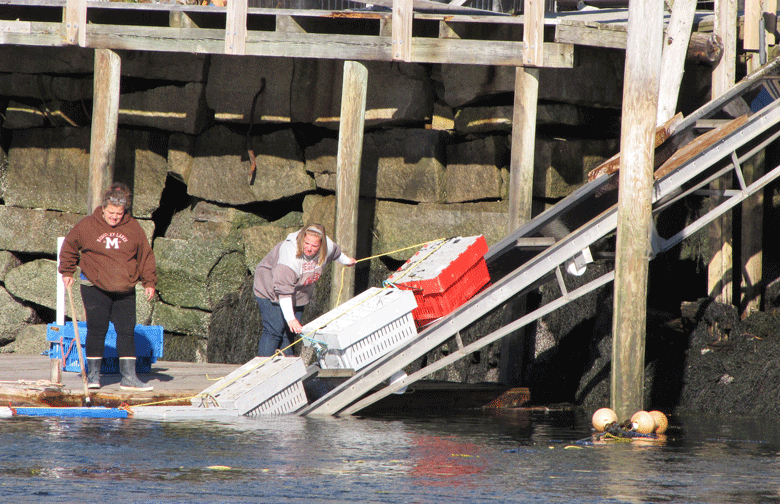I daydream about becoming a farmer. My vegetable garden last year would warn against it, and this year I didn’t even try to grow a tomato plant in a pot. Instead, I daydream of working on the water, farming scallops. I want to be an aquaculturist in my next life and spend my workday on the water, in the muck and the mess that is farming on and in the ocean.

I own a boat. I live on the water, on an island that provides access to all that Penobscot Bay has to offer. I know a thing or two about hard work. And in my younger years, before the desk job took over my career, I went to sleep at night with sore arms and an aching back from working on the river.
What’s stopping me from scallop farming? Time. Money. My better-informed colleagues telling me that there’s no way to make a profit. But if I’m honest, it’s more about the guts to start something new, to take a risk with my lobstermen neighbors watching. And probably, justifiably, laughing.
It takes guts to be a woman on the water, in a male-dominated fishery.
It takes guts to be a woman on the water, in a male-dominated fishery. It’s no surprise that women working in the Gulf of Maine are still among the minority. In 2020, the Maine Department of Marine Resources reported that women held 15% of the state’s highly competitive lobster licenses. While still a small percentage, it’s almost twice the number of the 8% of women-owned lobster licenses in 2016.
There is a mystique about women on the water and deserved admiration. Last year’s Boston Globe article featuring then 101-year-old lobsterwoman Virginia Oliver sparked thousands of memes. Maine’s “Lobster Woman” went viral, with people in awe of her Jedi-like abilities.
Virginia’s age was likely the primary reason for the online sensation, but I’d bet her gender played a role.
Last year’s Island Journal cover featured Hilary Walker who lobsters from the F/V Morningstar out of Vinalhaven. It was the first time the annual magazine cover featured a female lobsterman. I helped choose that cover story, and I can report that no other Island Journal cover has generated as many emails, calls, and comments—all in gratitude of putting a woman in the spotlight.

Across the U.S., women own a total of 11.6 million businesses, representing the fastest growing segment of the economy. According to the National Association of Women Business Owners (NAWBO), the share of women-owned businesses has “skyrocketed” from 4.6% in 1972 to 42% in 2019. These women-owned companies employ nearly nine million people and generate $1.7 trillion in sales as of 2017.
Despite this growth, “women face more obstacles than entrepreneurs in general when starting and growing their businesses. Eliminating barriers that thwart the success of women-owned businesses is an economic imperative that can spur innovation and improve productivity, which will create jobs, build wealth and grow the economy,” according to NAWBO.
In Maine, you can search a directory of women-owned businesses thanks to the work of Coastal Enterprises, Inc. (CEI). Its Maine Women’s Business List encourages consumers to shop women-owned businesses to fight gender inequality.
According to CEI’s site and sources, female entrepreneurs are asked less growth-oriented questions by potential funders, offered smaller loans at higher interest rates, and access only 2.3% of venture capital despite owning 42% of all companies in the U.S.
These insights are intended to help policymakers, funders, educators and supporting organizations in creating initiatives to help women start and grow thriving businesses. In the coming months, a team led by women at the Island Institute will be talking to alumnae of our Aquaculture Business Development program and others to determine how we can support their business ventures.
Our new Women on the Water project will combine our technical, financial, and human resources to sustain and expand women-owned aquaculture businesses and encourage others to invest at the juncture of two fast-growing sectors.
And maybe encourage a daydreamer or two.
Sue Bernier is chief philanthropy officer for the Island Institute, publisher of The Working Waterfront. She may be reached at sbernier@islandinstitute.org.





